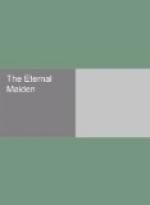“Au-oo-au-oo!” called the natives.
“Auoo-auoo!” the voices of Ootah and Koolotah returned.
Over the snow-covered stretch of level shoreland the moon poured a flood of silver incandescence. In this magical light the forms of Ootah and his companion were magnified into the likeness of those of the giants that the old men said once lived in the highlands. Their dogs were distended into creatures of the size of musk oxen. Their whips exploded as they dashed past the straggling line of snow and stone houses; the snow crisply cracked and splintered under their feet.
Then the village disappeared behind them. The voices of their tribesmen trailed shudderingly into silence.
The assembled tribe watched the teams diminishing in the distance. Presently someone whispered a terrible thing.
“Sipsu hath cursed Ootah.”
A low ominous murmur passed from lip to lip among the gathered men and women. In the distance a black speck in the moonlight marked the departing hunters.
“Yea, he hath called upon the spirit of the mountains to destroy Ootah.”
A low groan followed this.
“Methinks he hath prophesied too many deaths,” said Arnaluk.
“He hath declared that Koolotah’s mother will die.”
“And Koolotah—did he not say two moons ago that Koolotah would depart on a long journey from which he should never return?”
“And the wife of Kyutah—did she not perish after his evil prophesy? And Piuaitsoq—did not the spirit of the skin tents strike him when he lay asleep? And did not yon evil wretch tell of it long before?”
A dozen voices angrily rose in assent.
“Verily he hath found hatred in his heart for Ootah. For Ootah hath had no need of his powers. Did not Ootah’s mother sew into his cap the skin from the roof of a bear’s mouth? And hath he not become as strong as the bear? Did not his father place in his ahttee the feet of a hawk—and have not his own feet the swiftness of the wings of a bird? And doth not Sipsu hate him for his strength? Yea, as he hateth all who are young, who are brave, and who find joy in their shadow.”
Their voices rose threateningly. Maisanguaq, chagrined and bitter at the old man, leered among the crowd.
“Hath he not lived too long,” he whispered softly. And the others suddenly shouted:
“Let Sipsu die!”
In a wild rush they bore down upon the angakoq’s igloo. Screaming with rage they kicked in the sides. The icy dome shattered about the startled old man. They leaped upon him as hungry dogs upon a dying bear. A dozen hands ferociously gripped his throat. They moved to and fro in a mad struggle over the uneven ice. They seized hold of one another in the blood-thirsty desire to lay their hands upon the old man. He made no struggle. Finally all drew away. Amid the wreck of his igloo Sipsu lay, motionless, his face sneering evilly in the moonlight. His dead lips seemed to frame a curse.




